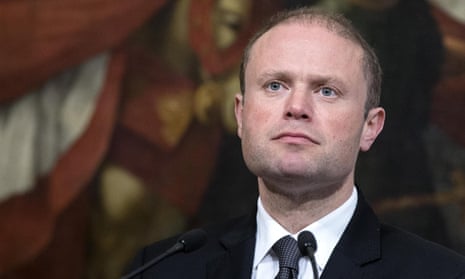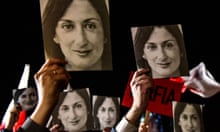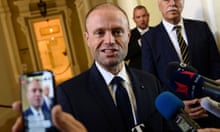Facebook has censored a Pulitzer prize-winning journalist for publishing a series of posts alleging corruption by the prime minister of Malta and his associates.
Matthew Caruana Galizia, a member of the International Consortium of Investigative Journalists’ award-winning Panama Papers team, was temporarily locked out of his Facebook account over four posts, which were deleted for violating the social network’s community standards.
“For me, this process was enlightening because I realised how crippling and punitive this block is for a journalist,” Caruana Galizia told the Guardian by email.
The posts, which were written in Maltese, contained allegations of wrongdoing by prime minister Joseph Muscat, his chief of staff Keith Schembri, and minister of energy Konrad Mizzi. Each post included images of documents from the Panama Papers leak.
The censorship of Caruana Galizia comes amid considerable political turmoil and intrigue in the Mediterranean island nation, where a snap election is scheduled for 3 June. It also again raises concerns over Facebook’s incredible power to disseminate – or block – news and information.
Last year’s publication of the Panama Papers – 11.5m documents from offshore law firm Mossack Fonseca – rocked Malta when it was revealed that Schembri and Mizzi had set up Panamanian shell companies. While Muscat’s administration survived that scandal, investigative journalist Daphne Caruana Galizia this April alleged that another offshore shell company belonged to Muscat’s wife and was used to accept payments. Muscat and his wife have denied receiving payments or being connected to the shell company, and have said they will sue for libel. They also pointed out that documents supporting the allegations have not been produced.
Muscat initiated a magisterial inquiry into the allegations, which is ongoing. The magistrate has referred allegations against Schembri to a separate investigation. Daphne Caruana Galizia has also been sued for libel by Mizzi and Schembri over allegations related to the shell company, which they deny.
On 7 May, Matthew Caruana Galizia, who is the son of Daphne Caruana Galizia, began publishing his own reporting on offshore companies and Maltese political figures on his Facebook page, using the hashtags #FattiKorrotti and #CorruptionFacts. The posts include scans of documents from the Panama Papers, including passports, bank statements, and letters, as well as Caruana Galizia’s explanation of their meaning.
On 10 May, the prime minister announced that he would sue Caruana Galizia for libel over the allegations in one of the posts, a move that was condemned by the European Union of Journalists, who said it had a “chilling effect” on press freedom.
On Tuesday 16 May, Caruana Galizia was locked out of his account for 24 hours. Several #FattiKorrotti posts were deleted.
Facebook is investigating the circumstances of the deletions. The site’s community standards bar the publication of “the personal information of others without their consent”, though it is unclear whether this is the standard Facebook deemed Caruana Galizia to have violated. Several other posts containing images of driving licenses or passports from the Panama Papers have not been deleted.
The deletions raise questions about how Facebook moderates journalism. In 2016, the social media site ignited a global controversy when it censored an iconic Vietnam war photograph of a naked child fleeing a Napalm attack. Facebook initially defended its decision, going so far as to delete a post by the Norwegian prime minister, because it was consistent with its policy barring nudity.
Facebook subsequently amended its policy, announcing that it would allow people to publish material that would otherwise violate its standards if it was found to be “newsworthy, significant, or important to the public interest”.
Documents related to alleged wrongdoing by public officials in the weeks before an election are in the public interest, and they have certainly been deemed newsworthy by the Maltese press, which has followed Caruana Galizia’s lead in reporting on them.
“It’s important that journalists can publish information that is in the public interest,” a Facebook spokesperson said in a statement. “We are investigating these posts and have spoken with Mr Caruana Galizia today so that he can publish what he needs to, without including unnecessary private details that could present safety risks. If we find that we have made errors, we will correct them.”
For Caruana Galizia – as for much of the news media – Facebook represented an opportunity to reach an important audience.
“I decided to start posting [on] Facebook because I was realising that very little of the information that was being published by newspapers was reaching people in their late teens and early twenties (university students included),” he said. “The response was incredible. I never expected anything like it.”
The posts were shared more than 1,000 times, according to the Times of Malta.
Caruana Galizia also expressed suspicion that the prime minister or his staff had pressured Facebook to delete the posts, an allegation that Kurt Farrugia, the head of communications for the office of the prime minister, denied.
This story has been updated to include a statement from Facebook.









